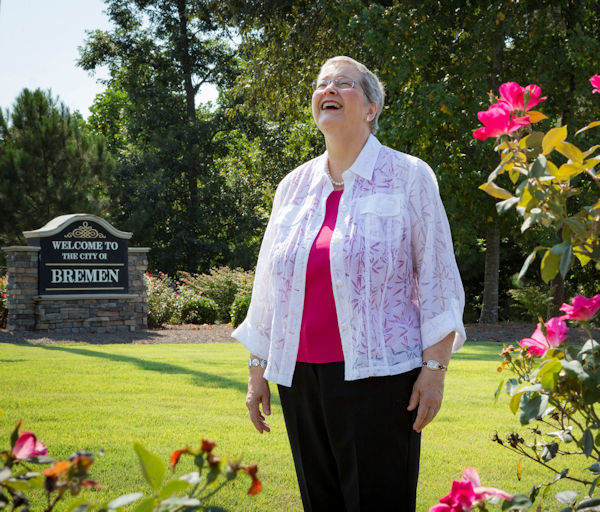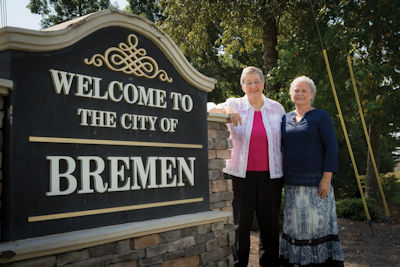Sharon Sewell dreams of taking a cruise to Alaska someday — when she has time. Right now, the four-term mayor of Bremen focuses her time and attention on the city’s 6,200-plus residents and on completing her year-long treatment for breast cancer.
“People know where to find me, and we have a wonderful city hall staff that makes my job easy,” Sewell said, a 68-year-old Bremen native who worked as a speech and language pathologist for the Haralson County and Bremen City Schools before retiring in 2010.
“I never intended to get into politics, but I couldn’t stand by and watch Bremen fade away,” she said. In addition to serving as mayor, she is the primary caregiver for her 90-year-old mother.

Winning her first election in 2001 and running unopposed in each election since, Sewell was grateful to be able to help revitalize Bremen after its decline in the late 1980s when the town lost its main industry, men’s clothing manufacturing.
Today, Sewell says Bremen is building a new identity as an affordable small town with growing businesses and a good school system — things that attract families and seniors alike.
Her life took another unexpected turn when Debbie Brewton, a city staff member, was diagnosed with breast cancer in October 2015. Sewell visited Brewton at city hall to encourage her and offered to use her position as mayor to help promote mammograms. When Brewton asked Sewell about her own mammogram, Sewell reluctantly admitted that she needed to have one.
“I couldn’t promote something to the residents of Bremen without having done it myself,” she said. “I hadn’t had a mammogram because I was healthy and had no history of cancer in my family. I didn’t think I was eligible for the breast cancer ride. I was so wrong.”
The mammogram revealed a tumor in her right breast, and a needle biopsy determined it was a HER2-positive, hormone-fed tumor. In less than one month, Sewell was enrolled in a clinical trial for a three-drug regimen used prior to surgery for patients with early stage breast cancer.
Raul G. Zunzunegui, MD, a Susan G. Komen Fellowship-trained breast specialist who is board-certified in surgery and a member of the Tanner Cancer Care team, knew the medication could reduce the probability of Sewell’s cancer returning.
“One of the unique aspects about cancer treatment at Tanner is the team-based approach we use,” said Dr. Zunzunegui. “We can call on one-another’s expertise, making the full treatment regimen of medical oncology, radiation oncology and surgery come together for the benefit of the patient.”
“I feel so fortunate that my friends had talked about Dr. Zunzunegui and that he worked with (Bradley Larson, MD, a board-certified medical oncologist with Northwest Georgia Oncology Centers and a member of the patient care team at Tanner Cancer Care) to get me on this particular drug. The way they worked together and shared information was phenomenal,” she said.
Every three weeks, Sewell had a chemotherapy treatment that left her feeling weak and concerned. She lost about 30 pounds and had joint pain and fatigue, but was encouraged by the personal touch provided by her treatment team at Tanner.
“I felt more like a person than a number. Dr. Zunaunegui would call me at home to see how I was doing. He would tell me he was going to be out of town but would check on me,” she said. “It was a blessing to know I could drive 20 minutes from Bremen to Carrollton instead of all the way to Atlanta, and still get equal or better care.”
After six chemo treatments, Sewell had a lumpectomy and 33 radiation treatments. She continues to receive chemo every three weeks, this time receiving only one drug, until she completes a full year of chemo.
Dr. Larson monitored Sewell’s progress as she underwent her treatments.

“No two breast cancers are exactly alike, and we have to consider treatment on a case-by-case basis,” said Dr. Larson. “Treatment can take a toll itself, but Ms. Sewell approached it with a great, optimistic attitude. That can make a big difference.”
Sewell said she applauds not only the physicians she’s worked with, but the nurses and other staff for their kindness and gentle approach to care.
“From the minute Dr. Zunzunegui called me about the biopsy results, I felt like I had put a saddle on to ride out a tornado. Everything happened so fast, yet Tanner exceeded my expectations in every encounter,” Sewell said.
At the same time, Sewell was exceeding the expectations of the residents of Bremen. Seeing the city water bill as an unlikely but effective communication tool, some years ago she began putting a personal letter in the monthly bill to inform residents about things ranging from a SPLOST initiative to a Thanksgiving feed the hungry fund raiser.
“Last October, I used the water bill letter to tell our story as part of our mission to be sure every woman in Bremen gets a mammogram,” she said. “People told me the letter motivated them to get checked. They would ask me when the next letter was coming out and how I was doing. It’s a personal touch our town has grown accustomed to.”
The impact of chemo caused a brief interruption in Sewell’s water bill letters, something that did not go unnoticed. She recounted a conversation with a woman who told her she was so glad to be getting the letters again.
“I want people to understand that cancer can happen to anyone at any age,” Sewell said. “I was one of those who never thought this would happen to me. I’m going to do whatever I can to get the word out. Early detection is helpful to a cure.”